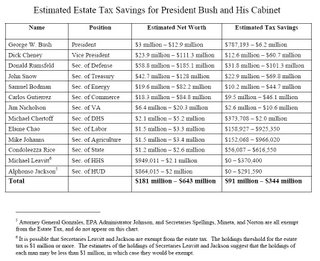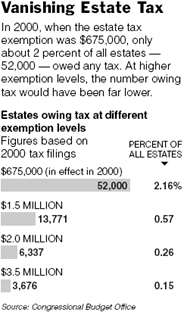Category: Estate and Inheritance TaxThe on-again, off-again, on-again saga of federal estate tax repeal, is on hold again.
Bloomberg.com reports in part:
"Senate Majority Leader Bill Frist postponed a vote on a measure to exempt most multimillionaires from federal estate taxes after conceding Republicans lack the votes to pass legislation adopted by the House last week.
The delay is the third since Frist began his quest to repeal or reduce the tax last year and the second time this month his ambitions were thwarted by Democrats who say the government needs the revenue generated by the tax. The House passed the legislation 269-156 on June 22 after Frist urged it to act before the Independence Day recess next week.
[Senator John] Kyl said Senate Republicans are determined to pass the legislation this year, though they want to ensure they have the 60 votes needed to withstand a challenge by Democrats. Republicans control 55 seats in the chamber; 60 votes are required to overcome filibusters, the legislative maneuvers that can kill legislation.
House MeasureThe House legislation would spare all but about 2,800 multimillion-dollar estates from federal tax by exempting the first $10 million of a couple's estate from any tax. Estates valued between $10 million and $25 million would be taxed at the capital-gains rate, while estates of more than $25 million would be taxed at top rates of 30 percent to 40 percent.
The measure, which would take effect in 2010, also includes a tax break for timber companies intended to lure Senate Democrats from timber-producing states such as Washington, Arkansas, and Louisiana.
The measure, characterized as a take-it-or-leave-it offer by House Ways and Means Committee Chairman Bill Thomas, a California Republican, has had a lukewarm reception in the Senate.
2,800 EstatesUnder current law, 12,600 estates -- or less than 1 percent of all people who die -- will be subject to the tax this year, according to estimates by the Tax Policy Center, a non-partisan research institution in Washington. The center estimated that a plan similar to Thomas's would reduce the number of taxable estates to 2,800 and would cut their tax rate to as low as 15 percent from about 45 percent.
The legislation also repeals a federal deduction for tax payments to the 23 states that retain their own estate or inheritance taxes, including Washington, Tennessee, Ohio, New York, New Jersey and Connecticut. That would subject residents of those states with large estates to double taxation, said Harley Duncan, executive director of the Federation of Tax Administrators, a Washington-based association of state tax officials. "



